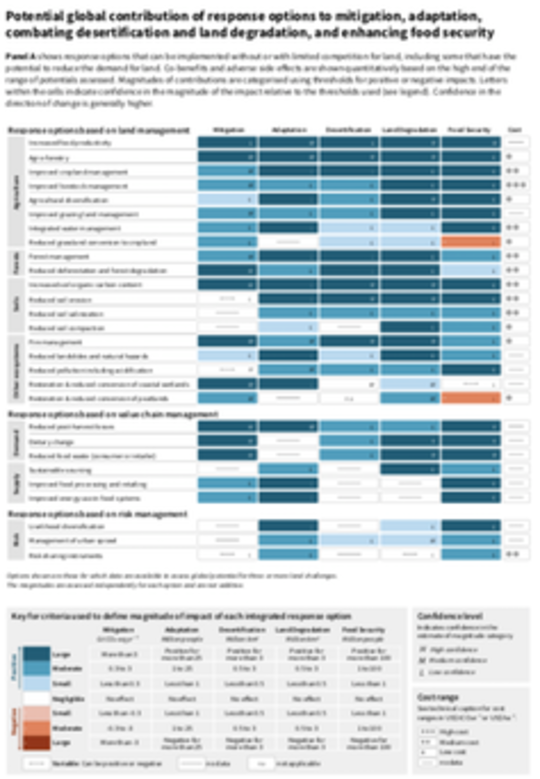
The IPCC is based in Geneva, Switzerland. Boxun Liu / shutterstock
In my day job, I am a scientist at the University of Aberdeen in Scotland studying things such as how agriculture contributes to climate change and what we can do about it. Recently, though, I found myself in Geneva, to take part in my fourth “adoption plenary” for a report of the Intergovernmental Panel on Climate Change (IPCC).
The report in question was the recent Special Report on Climate Change and Land, and I was one of its 15 convening lead authors, responsible along with two others for a 300-page chapter on links between desertification, land degradation, food security and climate change. The adoption plenary is the process by which the 195 governments who are part of the IPCC reach consensus on the wording of a much shorter (40 or so page) “Summary for Policymakers” (SPM) of an entire IPCC report, and thereby adopt its findings.
The process of approval is gruelling for all concerned: it’s allocated five days, with an additional reserve day allocated which is often used. During this period, every word of the policymakers’ summary has to be agreed and approved, line-by-line, with delegates from all governments in the room.
As an author, I had to respond to comments from the governments and, for example where language was unclear, to suggest another form of words that was consistent with the findings of the underlying report. Since the whole process of how IPCC reports are approved will be a mystery to most, I want to look at how this adoption process works and why we need to have them.

The author (centre right, with beard) discussing the scientists’ response to a government question. IISD/ENB | Mike Muzurakis
When certain text is contested, the chairs can propose a “huddle”, which is a short, unofficial, offline discussion between the authors and any interested government delegates to resolve the issue. The newly agreed text is then brought back to plenary for approval.
For very complex issues, “contact groups” are established. A contact group is an official break out group, chaired by two governments, and includes delegates from any other government who wishes to participate, along with the report authors, to clarify complex issues in detail.

Figure 3 – the result of two days discussion. IPCC
Contact groups may continue for several sessions over a number of days. One contact group, for example, spent two days hammering out the exact form and wording of the summary’s Figure 3. This summarised the findings of the whole report on the complex interactions between desertification, land degradation, food security and climate change. When agreement is reached, the outcomes still have to be approved in full plenary.
In terms of work involved, sessions each day often run well into early hours of the morning. On the final day of the land report, discussions ran all through the night and finished after midday the following day. It is extremely tiring for the government delegates and for the report’s authors. As a younger scientist, I certainly didn’t imagine I would sometimes end up working the hours of an investment banker.
Worth the effort
But the key reason I think it’s worth it is to do with the weight that the report carries after it has been adopted by governments. Once it has been adopted, it stops being our (the authors’) document, and it becomes their (the governments’) agreed document.
Governments can contest the findings of even the best peer-reviewed study – but with an IPCC report, once it is adopted, the government has already agreed to the findings and the report immediately gains more weight. IPCC reports are used by governments across the world to guide policy, and it is for this reason that scientific authors continue to put themselves through the hell of government adoption plenary.

The IPCC’s latest report looks at how climate change is linked to land use, and problems like desertification. Franck Boston / shutterstock
In the past, those sceptical of the government adoption process of IPCC reports have compared the final wording of the policymakers’ summary to earlier leaked versions and cite this as evidence of government interference in the scientific outcomes. But there are a few important things to note about this process.
Changes to the summary can only be made to better reflect the underlying report. Governments can’t simply propose statements to better fit their domestic agendas. Any changes to the summary do not change what is written in the underlying report, except through what is called “trickle-back”. For example, if a name of a practice is changed to be more easily understood in the summary, it will then be changed too in the underlying report to maintain consistency.
If certain figures or paragraphs of the SPM cannot be approved by governments, as sometimes happens (although not this time), this draws more attention to those sections and readers often go to find them in the underlying report to see what all the fuss was about.
For instance the section on “international cooperation” in the summary of the IPCC’s 2014 report on climate mitigation (section 5.2 here) was much shorter than the version that appeared in the technical summary. So people went to read the text there to find out what was missing. If any government ever wanted to suppress the science, failing to approve part of the Summary for Policymakers would be a sure-fire way to draw attention to the contested findings.

Success! The author celebrates with Thelma Krug from Brazil, an IPCC Vice-Chair. IISD/ENB | Mike Muzurakis
As well as the fatigue, all participants at various stages feel frustration when things are progressing slowly, and relief when agreement is eventually reached. Yet, at the end of this hellish process, I am really pleased with the outcome. But I’m also very happy to wait a few years until my next adoption plenary.
About The Author
Pete Smith, Professor of Soils and Global Change, University of Aberdeen
This article is republished from The Conversation under a Creative Commons license. Read the original article.
Related Books
Climate Leviathan: A Political Theory of Our Planetary Future
by Joel Wainwright and Geoff Mann How climate change will affect our political theory—for better and worse. Despite the science and the summits, leading capitalist states have not achieved anything close to an adequate level of carbon mitigation. There is now simply no way to prevent the planet breaching the threshold of two degrees Celsius set by the Intergovernmental Panel on Climate Change. What are the likely political and economic outcomes of this? Where is the overheating world heading? Available On Amazon
How climate change will affect our political theory—for better and worse. Despite the science and the summits, leading capitalist states have not achieved anything close to an adequate level of carbon mitigation. There is now simply no way to prevent the planet breaching the threshold of two degrees Celsius set by the Intergovernmental Panel on Climate Change. What are the likely political and economic outcomes of this? Where is the overheating world heading? Available On Amazon
Upheaval: Turning Points for Nations in Crisis
by Jared Diamond Adding a psychological dimension to the in-depth history, geography, biology, and anthropology that mark all of Diamond's books, Upheaval reveals factors influencing how both whole nations and individual people can respond to big challenges. The result is a book epic in scope, but also his most personal book yet. Available On Amazon
Adding a psychological dimension to the in-depth history, geography, biology, and anthropology that mark all of Diamond's books, Upheaval reveals factors influencing how both whole nations and individual people can respond to big challenges. The result is a book epic in scope, but also his most personal book yet. Available On Amazon
Global Commons, Domestic Decisions: The Comparative Politics of Climate Change
by Kathryn Harrison et al Comparative case studies and analyses of the influence of domestic politics on countries' climate change policies and Kyoto ratification decisions. Climate change represents a “tragedy of the commons” on a global scale, requiring the cooperation of nations that do not necessarily put the Earth's well-being above their own national interests. And yet international efforts to address global warming have met with some success; the Kyoto Protocol, in which industrialized countries committed to reducing their collective emissions, took effect in 2005 (although without the participation of the United States). Available On Amazon
Comparative case studies and analyses of the influence of domestic politics on countries' climate change policies and Kyoto ratification decisions. Climate change represents a “tragedy of the commons” on a global scale, requiring the cooperation of nations that do not necessarily put the Earth's well-being above their own national interests. And yet international efforts to address global warming have met with some success; the Kyoto Protocol, in which industrialized countries committed to reducing their collective emissions, took effect in 2005 (although without the participation of the United States). Available On Amazon
From The Publisher:
Purchases on Amazon go to defray the cost of bringing you InnerSelf.comelf.com, MightyNatural.com, and ClimateImpactNews.com at no cost and without advertisers that track your browsing habits. Even if you click on a link but don't buy these selected products, anything else you buy in that same visit on Amazon pays us a small commission. There is no additional cost to you, so please contribute to the effort. You can also use this link to use to Amazon at any time so you can help support our efforts.






















